Grand AVURUDUíS Past
Ruwini Jayawardana
  It is that time of the year again. It is the period when the call of
the koha (Asian Koel) is heard and the aroma of freshly made sweetmeats
scent the air. Avurudu, known as the Sinhala and Tamil New Year, is a
very special time for Sri Lankans. It is a time when people reach out to
each other to herald a new season. Happiness and harmony take to the
fore and old customs are rejuvenated. It is that time of the year again. It is the period when the call of
the koha (Asian Koel) is heard and the aroma of freshly made sweetmeats
scent the air. Avurudu, known as the Sinhala and Tamil New Year, is a
very special time for Sri Lankans. It is a time when people reach out to
each other to herald a new season. Happiness and harmony take to the
fore and old customs are rejuvenated.
For many of us in the suburbs this provides an opportunity to visit
our village and reunite with family and friends.
It is also one of the few occasions in which todayís generation will
be able to witness some of the fast dying traditions linked with the
season. Customs took center stage at the time a few decades back.
The celebrations were more heartfelt and everyone got together to
rejoice in the festivities.
Some prominent personalities of our country took us on a journey to
the past by sharing their Avurudu memories of yesteryear.
Irangani Serasinghe
(Senior actress)
 Everyone flocked at our ancestral home in Ruwanwella during this time
of year. Our parents believed in following the values to perfection.
Therefore we would perform the activities allocated for the auspicious
times and wear the Avurudu colours. Everyone flocked at our ancestral home in Ruwanwella during this time
of year. Our parents believed in following the values to perfection.
Therefore we would perform the activities allocated for the auspicious
times and wear the Avurudu colours.
One of my most significant Avurudu memories is that our father would
even anoint our three elephants with oil every year. We would scatter
ash pumpkin pieces in the garden for the koha.
My father and the villagers played gudu on the main road in front of
our house. The women folk got together and made sweetmeats early but me
and my sister used to polish off half of it secretly before the
auspicious hours!
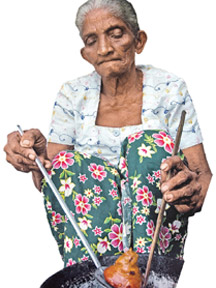
Edwin Ariyadasa
(Media personality and writer)
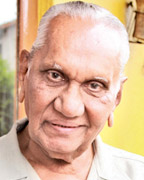 TS Eliotís The Waste Land states that April is the best time of the
year because Spring begins afresh. Avurudu is one of the oldest
festivals in the world celebrated by Sri Lankans and evokes a sense of
nostalgia in me. Today it is celebrated extensively due to the
involvement of the electronic and print media which popularises the
auspicious times and deeds. Such programmes bring the communities
together. However in the past Avurudu was not artificial. People
genuinely got together to celebrate the joys of the season by making
sweetmeats, wearing new clothes and playing games. TS Eliotís The Waste Land states that April is the best time of the
year because Spring begins afresh. Avurudu is one of the oldest
festivals in the world celebrated by Sri Lankans and evokes a sense of
nostalgia in me. Today it is celebrated extensively due to the
involvement of the electronic and print media which popularises the
auspicious times and deeds. Such programmes bring the communities
together. However in the past Avurudu was not artificial. People
genuinely got together to celebrate the joys of the season by making
sweetmeats, wearing new clothes and playing games.
I was the youngest in the family and would wait listening to the
carts coming along the road at night. This signified the arrival of my
brothers. Our astrologer would print the auspicious times on paper and
hand it over to us. There was a deep awareness on the need to perform
these rituals.
We were deprived of some of the things that we were used to but
mercifully mother would hide some food for us children. It was ok to eat
tit bits like that but serving food was prohibited.
Nature changes its outlook at this time of the year. In the past
people did not know what was happening and why nature was dying when the
seasons change from Spring and Summer to Autumn and Winter. Greek
historian Herodotus recorded how people used to lament about this
change. Today we have added various meritorious activities to the
celebrations. We go to the temple to evoke blessings when the whole
world starts living afresh.
Prof Sunil Ariyaratne
(Veteran lyricist, writer, filmmaker and senior lecturer of Sinhala
Language, Faculty of Mass Media and Communication, University of Sri
Jayawardenapura)
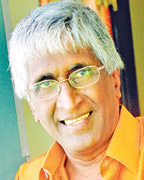 We used to visit my motherís home in Arawella for the Avurudu
holidays. The villagers engaged in various folk games. We were
especially keen to ride the revolving swing which is operated by
pedaling with your foot. It was quite a fascinating and frightening
experience for us children. We used to visit my motherís home in Arawella for the Avurudu
holidays. The villagers engaged in various folk games. We were
especially keen to ride the revolving swing which is operated by
pedaling with your foot. It was quite a fascinating and frightening
experience for us children.
The selection of an Avurudu Kumari from among the beauties in the
village was another popular item. I was once requested to compere the
event and by hearted all the lines praising womenís qualities included
in the Sandesha Kavyas.
We made bamboo mortars and lit them at the auspicious times.
Sybil Wettasinghe
(Renowned childrenís author and illustrator)
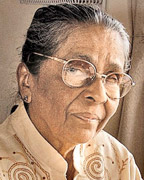 We usually get ready for the New Year around two months before the
date. Parents would tie swings for their children and the villagers
would bring out the furniture and throw buckets of water in and clean
the entire house. Around 10 to 15 people would gather to make sweetmeats
and about five or six of them would scrape coconuts. The nicest thing
about this time of the year is the harmonious atmosphere. We usually get ready for the New Year around two months before the
date. Parents would tie swings for their children and the villagers
would bring out the furniture and throw buckets of water in and clean
the entire house. Around 10 to 15 people would gather to make sweetmeats
and about five or six of them would scrape coconuts. The nicest thing
about this time of the year is the harmonious atmosphere.
I have written about my childhood experiences during Avurudu time in
my book Child in Me.
It was translated into Japanese by a Japanese lady. She was so
fascinated by the experiences described in the book that she visited my
village, Gintota, Galle, to witness some of these incidents with her own
eyes!
Nanda Malini
(Iconic vocalist)
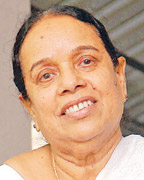 We visited Lewwan Doova for Avurudu. This was a long journey and we
start it off at the Maradana Railway Station many hours before the train
is due to set off. Then we take a bus to Auvitthava . From there on we
have to walk crossing foot bridges and paddy fields to reach our
grandparentsí home. We visited Lewwan Doova for Avurudu. This was a long journey and we
start it off at the Maradana Railway Station many hours before the train
is due to set off. Then we take a bus to Auvitthava . From there on we
have to walk crossing foot bridges and paddy fields to reach our
grandparentsí home.
Our house is located at the foot of a large rock. Our grandparents
begin the auspicious time for transactions with the well. They dump a
pot full of water scattered with a few jasmine flowers into the well and
take a fresh pot of water back from it. This pot of water is then
preserved by tying a clean piece of cloth to its mouth. It will be used
to begin transactions for the next Avurudu season.
We had nine children in our family. Our aunts, uncles and cousins too
gathered at our grandparentsí home during this time. Therefore it took a
long time for us to engage in the rituals because youngsters had to
worship everyone who is elder to them.
The betel leaves are plucked from our betel enclosure in the garden.
We also gathered flowers to arrange in baskets to be taken to the
temple.
It is pleasing to see that the children are at least making an effort
to follow some of these traditions. It was easier during our time
because our families were able to spend time together.
Dr Praneeth Abeysundara
(Senior Lecturer of Department of Sociology and Anthropology,
University of Sri Jayawardenapura)
 Though I was born and bred in Colombo we used to visit our fatherís
hometown, Balapitiya, for the Avurudu season. The 50-mile journey was
the starting point of the much-looked forward to adventure. The whole
family is united in our ancestral home. Though I was born and bred in Colombo we used to visit our fatherís
hometown, Balapitiya, for the Avurudu season. The 50-mile journey was
the starting point of the much-looked forward to adventure. The whole
family is united in our ancestral home.
All the sweetmeats were made at home. Weli Thalapa was especially
unique to our region. The elders were very strict about following the
rituals. We would perform the deeds according to the auspicious times,
engage in religious activities and wear clothes of the required colours.
That was how we were trained to be discipline.
Today Avurudu has become commercialised. All the sweetmeats and cakes
are brought from a nearby shop. Children do not get the opportunity to
experience the untarnished beauty of the season. We used to play in all
wood near our home which had trees laden with ripe cashew fruit. This
was how Martin Wickramasinghe described the revival of nature in books
like Madol Doova. He wrote about the true beauty of nature. We enjoyed
those splendours during our childhood.
Malani Fonseka
(Actress and MP)
 Every New Year was special during my childhood because I celebrated
it with my family. We would worship the elders by presenting them with
betel leaves and play various Avurudu related games. Every New Year was special during my childhood because I celebrated
it with my family. We would worship the elders by presenting them with
betel leaves and play various Avurudu related games.
Those days we celebrated it as an extended family but today we see
most people celebrating the dawn of the New Year with only the members
of their family.
This is because we all lead hectic lifestyles. I am glad that they
have at least made the effort to find time to celebrate the event in
this manner.
Dr Sumathy Sivamohan
(Head of English Department, University of Peradeniya)
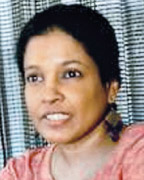 My recollections of the New Year are very sparse. My memories of
Avurudu are about my adult life, living in Colombo and Kandy. My recollections of the New Year are very sparse. My memories of
Avurudu are about my adult life, living in Colombo and Kandy.
I see it as one of the most disconcerting periods of the year. The
city goes bare and families are shut up within themselves.
I am immensely grateful to Muslim businesses. In the month of April,
they keep life going in the city. If you suddenly want a photocopy of
something, a scan or send a fax one has to go in search of a Muslim
concern. Once I was travelling on one of the highways, and we passed
town after town without coming across a proper eating place, until we
came to a Muslim-owned eating place.
Culturally, socially and physically these shops keep us going during
the New Year.
Ravindra Randeniya
(Actor and Presidential Advisor for Development of Cinema)
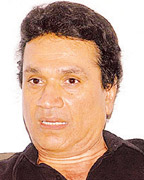 I was born into a semi urban area, Dalugama, Kelaniya. We visited our
ancestral village, Sapugaskanda, for Avurudu. It was untouched by
industrialisation and we used to pass rubber plantations and paddy
fields on our way. I was born into a semi urban area, Dalugama, Kelaniya. We visited our
ancestral village, Sapugaskanda, for Avurudu. It was untouched by
industrialisation and we used to pass rubber plantations and paddy
fields on our way.
The atmosphere was similar to a carnival since the whole village is
getting set to celebrate the New Year. You are able to hear the cuckooís
call, see Erabadu flowers, smell the delicious aroma of food and eat
ripe, juicy mangos plucked from the trees. These are signs that the
earth is coming back to life in its full bloom. We see mother earth
preparing for the new season. These happenings occur three of four days
before the dawn of Avurudu. Though our family is Christian we
automatically become part of the festivities. We too buy new clothes and
get together to play elle or throw the dice with our friends. I
appreciate the values linked with Avurudu and believe that it should be
carried forward to future generations.
Avurudu has become just another day for most people today. The most
significant thing about it is that it is a holiday for them. Following
the traditions has become a mechanical process for them. They lack the
emotional involvement found in rural villages.I cherish these memories
of my childhood. They will be engraved in my mind for years to come. |





